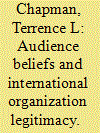| Srl | Item |
| 1 |
ID:
092087


|
|
|
|
|
| Publication |
2009.
|
| Summary/Abstract |
Recent work suggests that multilateral security institutions, such as the UN Security Council, can influence foreign policy through public opinion. According to this view, authorization can increase public support for foreign policy, freeing domestic constraints. Governments that feel constrained by public opinion may thus alter their foreign policies to garner external authorization. These claims challenge traditional realist views about the role of international organizations in security affairs, which tend to focus on direct enforcement mechanisms and neglect indirect channels of influence. To examine these claims, this article investigates the first link in this causal chain-the effect of institutional statements on public opinion. Strategic information arguments, as opposed to arguments about the symbolic legitimacy of specific organizations or the procedural importance of consultation, posit that the effect of institutional statements on public opinion is conditional on public perceptions of member states' interests. This article tests this conditional relationship in the context of changes in presidential approval surrounding military disputes, using a measure of preference distance between the United States and veto-wielding members of the UN Security Council. Findings indicate that short-term changes in presidential approval surrounding the onset of military disputes in the United States between 1946 and 2001 have been significantly larger when accompanied by a positive resolution for a Security Council that is more distant in terms of foreign policy preferences. The article also discusses polling data during the 1990s and 2000s that support the strategic information perspective.
|
|
|
|
|
|
|
|
|
|
|
|
|
|
|
|
| 2 |
ID:
184306


|
|
|
|
|
| Summary/Abstract |
Scholars and policy makers debate whether elites and citizens hold different views of the legitimacy of international organizations (IOs). Until now, sparse data has limited our ability to establish such gaps and to formulate theories for explaining them. This article offers the first systematic comparative analysis of elite and citizen perceptions of the legitimacy of IOs. It examines legitimacy beliefs toward six key IOs, drawing on uniquely coordinated survey evidence from Brazil, Germany, the Philippines, Russia, and the United States. We find a notable elite–citizen gap for all six IOs, four of the five countries, and all of six different elite types. Developing an individual-level approach to legitimacy beliefs, we argue that this gap is driven by systematic differences between elites and citizens in characteristics that matter for attitudes toward IOs. Our findings suggest that deep-seated differences between elites and general publics may present major challenges for democratic and effective international cooperation.
|
|
|
|
|
|
|
|
|
|
|
|
|
|
|
|